Reply To:
Name - Reply Comment
Last Updated : 2024-04-23 16:21:00
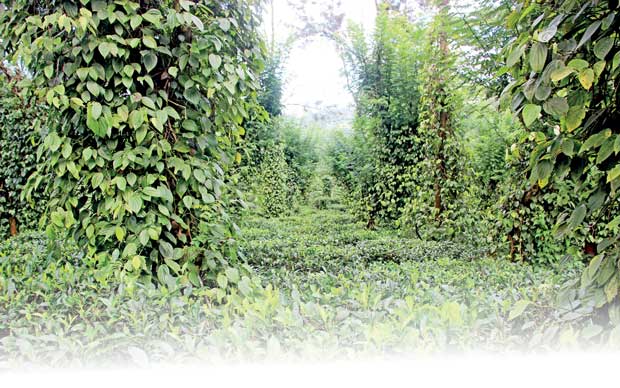
 As the county’s tea industry and tea plantations are grappling with multiple challenges stemming from overused soil, poor harvests, climatic hazards and declining demand, a Sri Lankan tea planter has taken the road less travelled to overcome these challenges with an innovative approach.
As the county’s tea industry and tea plantations are grappling with multiple challenges stemming from overused soil, poor harvests, climatic hazards and declining demand, a Sri Lankan tea planter has taken the road less travelled to overcome these challenges with an innovative approach.
As the years passed, Malwatte Valley Plantations PLC (MVP), a tea planting company that took over its business from the Janatha Estate Development Board in 1992, soon realised that the Sri Lankan tea industry was facing too many challenges in the international market place. Having tried with tea, they had to think out of the box and find ways to make profits while continuing with tea as its main business. They had adequate land, given on a 50-year lease by the government and there was an excessive labour force. Hence, they started an alternative plantation in the uncultivated land, intercropping with tea. 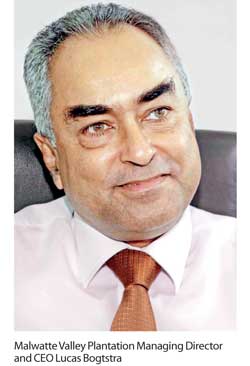
“We used to manufacture small leaf tea where you need to use milk and sugar. We were supplying markets like Egypt, Pakistan and the UK. Then Kenya came to the scene and produced a brand of tea, the quality of which was as good as Ceylon tea and much lower in price,” explained Malwatte Valley Plantations Managing Director and Chief Executive Officer Lucas Bogtstra.
“So we lost all those markets. Then the Sri Lankan tea industry started manufacturing big leaf tea for the Middle Eastern markets and 60 to 65 percent of the tea produced in Sri Lanka went to five countries— Russia, Ukraine, Syria, Iran and Iraq. But if you look at all these countries today, they are in turmoil. So what is the next situation? Where should we go from there? We have to look at new avenues and new markets,” said Bogtstra.
While looking at alternative and lucrative markets like China, which consume alternative brands of tea like green tea, Malwatte Valley Plantations was looking for alternative crops and they came across pepper, one of the spices Sri Lanka is famous for from ancient times.
“Pepper and other spices have changed the whole South Asian culture, economy and politics. When Vasco da Gama landed in Goa in India, they came all the way looking for spices. Before that, the Arabs came. Behind that, the Dutch came and finally the British came here. More than anything else, they came here looking for spices,” said W.D.L. Gunaratne, Executive Director of International Pepper Community (IPC), an intergovernmental organisation established in 1972 auspice of the United Nations-Economic and Social Commission for Asia and the Pacific (UN-ESCAP).
It was a remarkable coincidence that Malwatte Valley Plantations won the prestigious award as the ‘World’s Best Pepper Farmer’ when Gunaratne, a Sri Lankan, is holding a leading post in the IPC, an organisation consisting of pepper producing countries in the world. Gunaratne, who was the former Head of the Agriculture Department of Sri Lanka, is an expert in spices and specially when it comes to pepper.
Sri Lankan Pepper
“Sri Lanka, which is historically famous for its quality spices, still can gain a lot internationally by 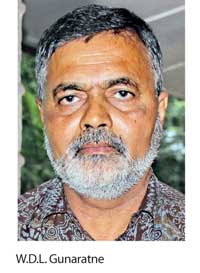 producing more spices. For example, more than 80 percent of the true cinnamon to the world market is provided by Sri Lanka. A unique feature of Sri Lankan cinnamon is that no one in the world can make the quill so well like in Sri Lanka. I don’t know the reason for this. So, this has been a unique feature of our cinnamon. ” explained Gunaratne, who has in-depth knowledge on the subject.
producing more spices. For example, more than 80 percent of the true cinnamon to the world market is provided by Sri Lanka. A unique feature of Sri Lankan cinnamon is that no one in the world can make the quill so well like in Sri Lanka. I don’t know the reason for this. So, this has been a unique feature of our cinnamon. ” explained Gunaratne, who has in-depth knowledge on the subject.
“The second in this line is pepper. India says its origin was in the southern part of India but I believe that it was in Sri Lanka as well. This may be one of the places of origin of pepper in the world,” he asserted.
“We have more than 10 or 12 species of pepper in Sri Lanka and the unique feature of Sri Lankan pepper is it has the highest pungency and aroma. The major chemical component in pepper is piper nigrum and the highest content of piperine in the world is found in Sri Lanka pepper. Therefore, there is so much of potential open to the world market. We have all the natural blessings,” Gunaratne explained Sri Lanka’s potential to become a leading pepper producing country in the world.
“India is the third largest pepper producer in the world. But they import our pepper. Why do they import nearly 60-70 percent of Sri Lankan pepper? That is for the value addition and quality,” he added.
“Countries like Indonesia, Malaysia and Vietnam never do this. They wait until the correct maturity. We annually harvest around 20,000 tonnes and we can easily make it 30,000 tonnes if we wait.”
Model for the country
He also spoke about Malwatte Valley Plantations becoming the World’s Best Pepper Farmer at the annual session of the IPC in Jakarta last year.
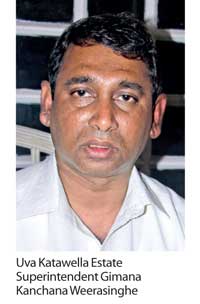 “This award was given after evaluation of their systems and productions and all other things by an independent panel. The pepper plantation in Malwatte Valley Plantations may be a model for the country and for the world as well in time to come,” he explained the huge potential available to the tea planting company.
“This award was given after evaluation of their systems and productions and all other things by an independent panel. The pepper plantation in Malwatte Valley Plantations may be a model for the country and for the world as well in time to come,” he explained the huge potential available to the tea planting company.
“Malwatte is the model for all pepper plantations and this might become the world’s biggest pepper plantation,” he added.
“In 2009 and 2010, pepper people said there is no future for pepper because at that time the price was around US $ 2 or 3 per kilo of pepper. Even the pepper community encouraged the producer countries to consume their produce. But in 2015, the largest production of pepper was reported as 315,000 metric tonnes and still the prices are going high, that means, the prices are going up. According to what I feel, people are looking for more natural flavours due to the health-related problems,” he added.
In 2013, the total pepper production in Sri Lanka was 38,000 metric tonnes.
Gimana Kanchana Weerasinghe, who was given the responsibility to promote pepper in Malwatte Valley Plantations in Uva Ketawalla around 2008, said that losses in tea and also rubber forced them to look for alternative crops.
“Pepper came to my mind and there were already 50 vines in my estate that was planted 1998. Outsiders were getting the harvest and that was not being used. In 2011, we started harvesting. The first crop was about 42 kilos of dry pepper. We got Rs.750 per kilo. We got around Rs.24,000.
So, I studied about pepper and realized that pepper is suitable for this climate. The elevation, soil condition, climate and annual rainfall were all suitable for pepper. I gave the proposal to our late MD and he gave the green light to go ahead,” says Kanchana.
Since then Malwatte Plantation was generating a rapid increase in its income from pepper. It collected around Rs 65,000 in 2012, Rs. 97,000 in 2013 and Rs. 350,000 in 2015.
“We started pepper way back in 2003. We started with about 50 wines in the Unugala Plantation in Badulla. At that time, no tea plantation had done it on a huge commercial scale. That was an idea by my father. He had been doing pepper in some of his own plantations. And we saw it was working and then we put a few more in Uwa Ketawalle Plantation in Badulle,” said Bogtstra about his new finding.
“Around 2004 and 2005, we started on a small scale but it was about 2008 that we really started moving forward with pepper. By then we were quiet confident it was going to work,” he added.
As the new pepper vines were slowly but steadily taking their roots in these newly found grounds, the management of Malwatte Valley Plantations was closely and carefully observing its experiment introducing pepper to the tea plantation on a major scale.
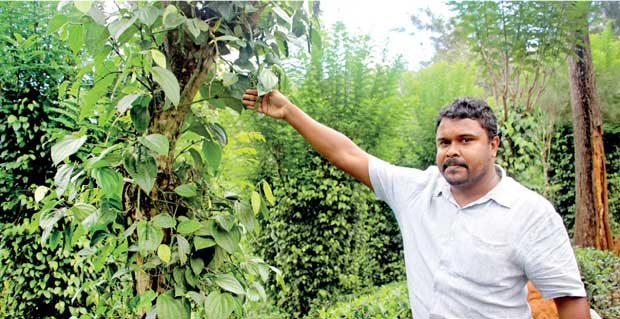
Long-term plans
“Agriculture is not overnight business. It takes time and they are big investments. Once it is 100 percent sure that it is working well, then we went into it,” said Bogtstra.
Now that the business is firmly on the ground and even recognised internationally, Malwatte Valley Plantations has long-term plans to plant 300,000 new vines among its tea plants and also as a mono-cultivation by the year 2019.
“The award is a good achievement and I think that is good for the country as well because we are projecting Sri Lanka on the map and a Sri Lankan company to get those awards is quiet a phenomenon,” the Managing Director said.
When asked about the challenges the plantation industry is facing and why such innovative thinking cannot be planned in the long term in government-owned plantations, Bogtstra is of the view that having no clear government policy is a big hurdle for the future of the plantation industry.
“Many tea plantations have to be replanted because tea is old. The point is, the company has 23 years left for its lease. So, what the company is telling the government is, if you can increase the 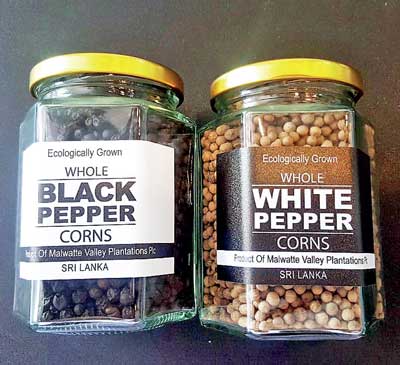 lease to about 99 years, then we will replant them for you. If it is 99 years, we have a bankable document and we can go to any bank and get the money. You need the government intervention to revive the tea industry,” he said.
lease to about 99 years, then we will replant them for you. If it is 99 years, we have a bankable document and we can go to any bank and get the money. You need the government intervention to revive the tea industry,” he said.
“You have to keep moving when markets get difficult. And you have to keep moving your feet and you can’t say the markets are coming down and what can we do. So we are losing money. You must keep you feet and find your own ways. For this you need creative thinking.”
However, Bogtstra was optimistic and was happy about the company’s achievement, specially in times of trouble and turmoil.
“You see, even from a problematic situation, there are opportunities. And a lot of opportunities come when there are problems because when there are problems you look at doing things little differently. Otherwise you are little too comfortable and little too happy going smoothly and you don’t venture into looking at other areas.
So, problems are really good; they create opportunities. We are quite fond of problems. When there are problems, you don’t change for worse, you change for better. You have to do something different,” the MD said, explaining the driving force behind the company’s innovative thinking and its success.
Going a step further, Malwatte Valley Plantations is planning to brand its pepper just like its tea.
“Uva tea is the highest selling tea in Sri Lanka during the July-August season. It sells at four, five or six times the price of the normal tea. But our crops are very low and so what happens is, it is compensated by price. So, likewise, we have found that pepper in Uwa has a fantastic aroma and we have got reports from Indonesia.”
“Our purpose in the whole thing is not just to produce and sell; we want to add value to all our products. If you add value, you must know what you are selling. So, you have to analyse your product. So, just like the Uva tea, which is well known internationally, we are trying to market pepper from Uva as Uva pepper,” the MD added.
Pics by Pradeep Pathirana

Add comment
Comments will be edited (grammar, spelling and slang) and authorized at the discretion of Daily Mirror online. The website also has the right not to publish selected comments.
Reply To:
Name - Reply Comment
On March 26, a couple arriving from Thailand was arrested with 88 live animal
According to villagers from Naula-Moragolla out of 105 families 80 can afford
Is the situation in Sri Lanka so grim that locals harbour hope that they coul
A recent post on social media revealed that three purple-faced langurs near t